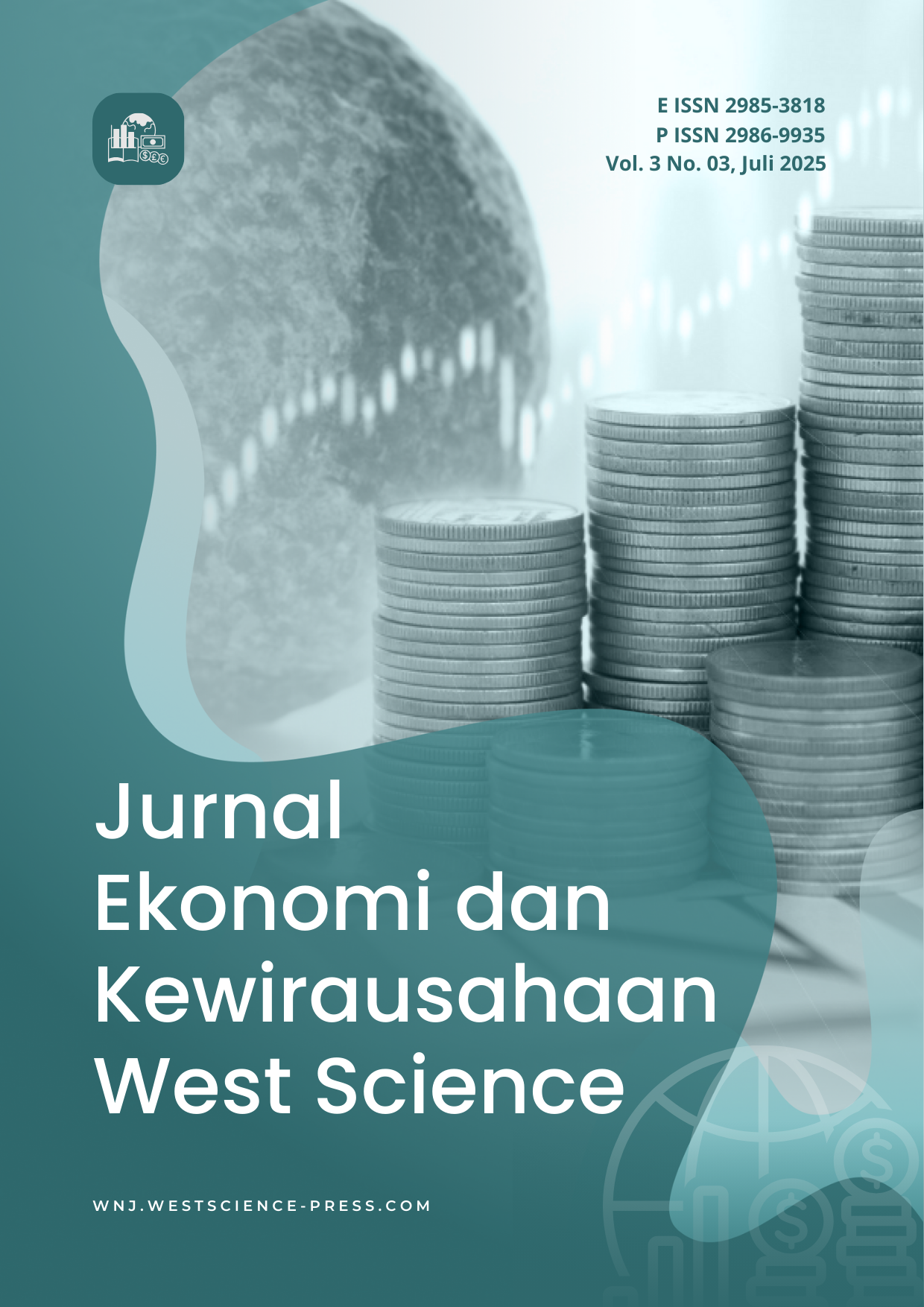Dampak Pelatihan Kewirausahaan terhadap Peningkatan Pendapatan Pelaku Usaha Mikro di Wilayah X
DOI:
https://doi.org/10.58812/jekws.v3i03.2510Kata Kunci:
Pelatihan Kewirausahaan, Pengetahuan Kewirausahaan, Pertumbuhan Pendapatan, Wirausaha Mikro, SEM-PLSAbstrak
Penelitian ini mengkaji pengaruh pelatihan kewirausahaan dan pengetahuan kewirausahaan terhadap pertumbuhan pendapatan wirausaha mikro di Wilayah X. Dengan menggunakan desain penelitian kuantitatif, data dikumpulkan dari 120 responden melalui kuesioner terstruktur dan dianalisis menggunakan Structural Equation Modeling–Partial Least Squares (SEM-PLS) versi 3. Hasil penelitian menunjukkan bahwa baik pelatihan kewirausahaan maupun pengetahuan kewirausahaan memiliki pengaruh yang signifikan dan positif terhadap pertumbuhan pendapatan. Model pengukuran menunjukkan reliabilitas dan validitas yang tinggi, sementara model struktural menunjukkan relevansi prediktif yang kuat dengan nilai R² sebesar 0,533. Temuan ini menyoroti peran kritis pembangunan kapasitas dalam meningkatkan hasil ekonomi wirausaha mikro. Studi ini mendukung penerapan Teori Modal Manusia dan Perspektif Berbasis Sumber Daya sebagai kerangka konseptual dan memberikan implikasi praktis bagi pembuat kebijakan, lembaga pelatihan, dan praktisi pembangunan dalam merancang mekanisme dukungan yang efektif untuk pertumbuhan usaha mikro.
Referensi
Aizuddin, N., & Adam, S. (2021). A review on impact of entrepreneurship training program towards entrepreneur’s entrepreneurial performance. International Journal of Academic Research in Business and Social Sciences, 11(4), 771–779.
Akemu, O., Colapinto, C., & Kishan, P. (2023). Teach Them to Fish: When Does Business Training Improve SMEs’ Management and Business Practices? Academy of Management Proceedings, 2023(1), 15342.
Alfiannur, M., & Winarso, B. S. (2023). Pengaruh pengetahuan kewirausahaan, strategi pemasaran dan lokasi usaha terhadap keberhasilan UMKM (Studi kasus pada pengrajin perak Kotagede, Yogyakarta). Equilibrium: Jurnal Ekonomi-Manajemen-Akuntansi, 19(1), 75–86.
Bakhru, A., & Grant, R. M. (2005). Knowledge. based assets in entrepreneurial ventures. MA Hitt, & DA Ireland, The Blackwell Encyclopedia of Management, 167–170.
Bontis, N., Keow, W. C. C., & Richardson, S. (2000). Intellectual capital and business performance in Malaysian industries. Journal of Intellectual Capital, 1(1), 85–100.
Chandy, R., Anderson-McDonald, S., & Zia, B. (2016). Pathways to Profits: Identifying Separate Channels of Firm Growth Through Business Training. World Bank Policy Research Working Paper, 7774.
Dohse, D., & Walter, S. G. (2012). Knowledge context and entrepreneurial intentions among students. Small Business Economics, 39(4), 877–895.
Fiet, J. O., Kerrick, S. A., Kosmidou, V., & Naskar, S. T. (2015). SPECIFIC KNOWLEDGE AS A KEY TO LAUNCHING SUCCESSFUL NEW VENTURES. Frontiers of Entrepreneurship Research, 35(16), 3.
Gamage, P., & Weerakoon, W. (2017). Relationship between Entrepreneurial Knowledge and Strategic Orientation. International Journal of Scientific and Research Publications, 7(11), 56–86.
Giner Crespo, V., Azuara Grande, A., & Saldaña Larrondo, D. E. (2024). The usage of total knowledge by entrepreneurs in business decision-making.
Jayachandran, S. (2021). Microentrepreneurship in developing countries. Handbook of Labor, Human Resources and Population Economics, 1–31.
Katz, J. A. (2014). Education and training in entrepreneurship. In The psychology of entrepreneurship (pp. 241–268). Psychology Press.
Lyons, E., & Zhang, L. (2018). Who does (not) benefit from entrepreneurship programs? Strategic Management Journal, 39(1), 85–112.
Martínez, C., Puentes Encina, E., & Ruiz-Tagle Venero, J. (2015). Do Micro-Entrepreneurship Programs increase wage-work? evidence from Chile.
Matthew, O. O., Adewale, A. J., Victoria, O. B., & Adamu, T. J. (2024). Entrepreneurial Competency And Entrepreneurial Success: A Conceptual And Empirical Review. Global Journal of Social Sciences, 23(2), 253–268.
Mohan, S., & Revathi, R. (2012). Impact of training on entrepreneurial development. International Journal of Research in Management, 6(7), 1–6.
Newkirk‐Moore, S., & Bracker, J. S. (1998). Strategic management training and commitment to planning: critical partners in stimulating firm performance. International Journal of Training and Development, 2(2), 82–90.
Nieuwenhuizen, C., & Kroon, J. (2002). Creating wealth by financing small and medium enterprises of owners who possess entrepreneurial skills. Management Dynamics: Journal of the Southern African Institute for Management Scientists, 11(1), 21–28.
Putta, S. S. (2014). Improving entrepreneur’s management skills through entrepreneurship training. Journal of Commerce and Management Thought, 5(3), 459–474.
Quingco, J. G., & Leonoras, C. S. (2019). The economic impact, contribution, and challenges of micro business enterprises to the local development. Philippine Social Science Journal, 2(2), 107–122.
Seitz, H. (2017). Microenterprises in developing countries: Is there growth potential? DIW Roundup: Politik im Fokus.
Tominc, P., & Tominc, B. G. (2015). Entrepreneurial activity, education and training. Global Journal of Research in Business & Management, 2(2), 96–102.
Trirahayu, D. (2023). Effects of Employee Training and Development Programs on Corporate Financial Performance. Atestasi: Jurnal Ilmiah Akuntansi, 6(1), 511–527.
Urefe, O., Odonkor, T. N., Chiekezie, N. R., & Agu, E. E. (2024). Enhancing small business success through financial literacy and education. Magna Scientia Advanced Research and Reviews, 11(2), 297–315.
Vial, V. (2011). Micro-entrepreneurship in a hostile environment: evidence from Indonesia. Bulletin of Indonesian Economic Studies, 47(2), 233–262.
Vial, V., & Hanoteau, J. (2015). Returns to micro-entrepreneurship in an emerging economy: A quantile study of entrepreneurial Indonesian households’ welfare. World Development, 74, 142–157.
Yertas, M. (2024). The Role of Training and Continuous Development in Improving Employee Productivity and its Impact on Company Financial Performance. Atestasi: Jurnal Ilmiah Akuntansi, 7(2), 1362–1379.
Unduhan
Dimensions
Diterbitkan
Terbitan
Bagian
Lisensi
Hak Cipta (c) 2025 Siti Zulaika, Gopur Gopur, Nunung Apriani, Mohammad Gifari Sono

Artikel ini berlisensiCreative Commons Attribution-ShareAlike 4.0 International License.






















 Instagram
Instagram 